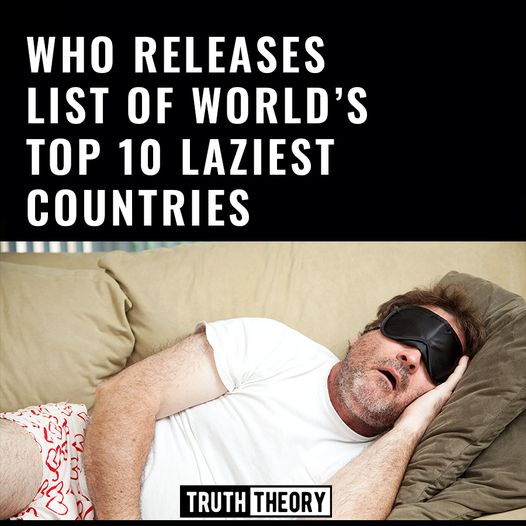Are you lazy and don’t know it? If so, it’s time to gain some awareness. Recently, the World Health Organization (WHO) released a list of the top 10 laziest countries in the world. And, the results are surprising. For the study, the WHO tracked rates of physical activity around the world. The results, which were published in The Lancet Global Health, revealed which countries are the least active and, thus, the laziest.
The study included 1.9 million people in 168 countries. According to the WHO, those who participated in the survey represent 96 percent of the global population. The organization found that in 2016, only one-quarter of all adults (approximately 1.4 billion people) were not getting enough activity. This put them “at risk of developing or exacerbating diseases linked to inactivity.” Conditions that fall under this category include some cancers, stroke, and diabetes.
The WHO defined being active as exercising at least 75 minutes each week, 150 minutes of moderate activity, or a combination of both. With these standards, the WHO discovered that the laziest country is Kuwait, where 67 percent of the population does not engage in regular exercise. The second laziest? American Samoa, with just 53.5 percent of the population exercising regularly.
THE 10 LAZIEST COUNTRIES FOLLOW:
- Kuwait (67 percent not doing enough activity per week)
- American Samoa (53.4 percent)
- Saudi Arabia (53 percent)
- Iraq (52 percent)
- Brazil (47 percent)
- Costa Rica (46.1 percent)
- Cyprus (44.4 percent)
- Suriname (44.4 percent)
- Colombia (44 percent)
- Marshall Islands (43.5 percent)
Surprisingly to some, the US ranked 143rd with just 40 percent of adults not doing enough exercise. The UK ranked 123rd with 35.9 percent of the country rarely exercising.
The countries that ranked the highest include Uganda. According to IFLScience, just 5.5 percent of the country does not exercise enough each week. Mozambique, Lesotho, Tanzania, and Niue ranked similarly to Uganda.
THE 10 MOST ACTIVE COUNTRIES FOLLOW:
- Uganda (5.5 percent)
- Mozambique (5.6 percent)
- Lesotho (6.3 percent)
- Tanzania (6.5 percent)
- Niue (6.9 percent)
- Vanuatu (8 percent)
- Togo (9.8 percent)
- Cambodia (10.5 percent)
- Myanmar (10.7 percent)
- Tokelau (11.1 percent)
The WHO has an ambitious plan to reduce physical inactivity by 10 percent in 2025. Based on this data, the world is “not on track.” In high-income countries, physical activity tends to be high due to fitness and healthy eating trends.
“A significant increase in national action is urgently needed in most countries to scale-up implementation of effective policies,” said the WHO. “However, implementation will require bold leadership and full engagement across sectors to change the current approach.”
What are your thoughts? Please comment below and share this news.
